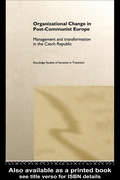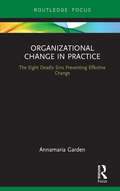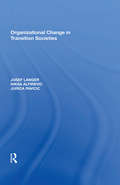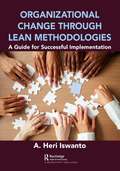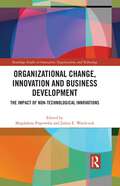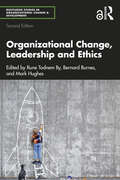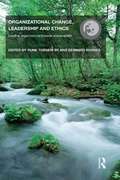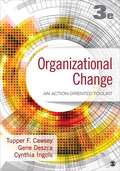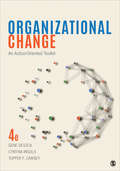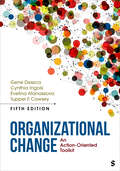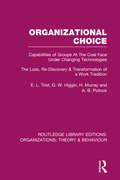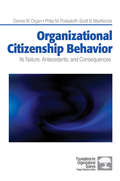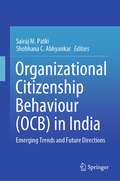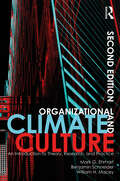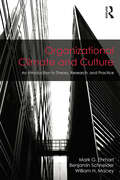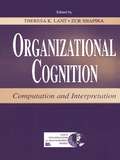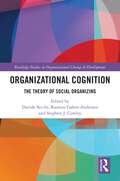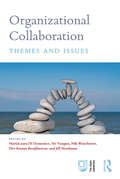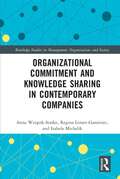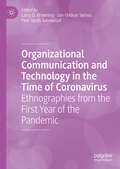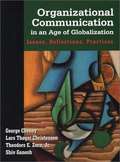- Table View
- List View
Organizational Change in Post-Communist Europe: Management and Transformation in the Czech Republic (Routledge Studies of Societies in Transition)
by Ed Clark Anna SoulsbyThis book provides a unique and detailed examination of the complex processes of transformation in former state-owned enterprises in the Czech Republic. Drawing on in-depth case studies of organizational transformation, the authors adopt a social-institutionalist approach to the study of organizational change, applying it in order to develop an explanation of organizational restructuring and management redefinition during the early transition period of 1990-1996. In particular, they highlight how these processes have been shaped by continuing historical state-socialist legacies and the powerful role played by senior managers in their efforts to fashion the new privatized organizations in their own interests.
Organizational Change in Practice: The Eight Deadly Sins Preventing Effective Change
by Annamaria GardenThis book challenges the practice or organizational change programmes. It uses two case studies in depth to illustrate that consulting companies can often get it wrong. Senior managers often do not know enough about managing change. The text is arranged around eight deadly sins to avoid in the practice of change: self-deception of the change agents rather than self-awareness; destruction of the identity of the organization caused by arrogance; especially of the large consulting companies; destruction of cohesion; gobbledygook language; concentrating on structural change, not behavioural change; making the organization worse, not better; the intelligence in resistance; and the deep trauma of redundancy. The author's main objective is to get academics and practitioners to stop and think about what they are doing when they work with organizations. Organizational Change in Practice will be of interest to business professionals seeking to understand how change can impact their organization as well as organizational consultants.
Organizational Change in Transition Societies (Transition And Development Ser.)
by Josef Langer Niksa Alfirevic J PavicicThis book discusses change management paradigms with special reference to examples and cases from the transition societies in Central and Eastern Europe (CEE). The first chapter analyses developments and trends in the wider societal context of Central and Eastern Europe. Theoretical perspectives are applied to understand the processes of transition and EU accession in Central and Eastern Europe. Following the second and third chapters, the most frequently used tools and procedures of change management are analysed from the perspective of a CEE organization. The special advantage of the text to the potential readership is the integration of 'macro' (societal) and 'micro' (organizational) points of view towards understanding change. The text also provides real-life examples and perspectives of understanding and managing change from Central and Eastern Europe, which helps the reader to grasp the wider political, economic and societal context(s) of the CEE region.
Organizational Change through Lean Methodologies: A Guide for Successful Implementation
by A. Heri IswantoLean is a type of organizational change brought about through improvement methods based on cost reduction mechanism. The assumption is that by reducing costs, the organizations can work better and more efficiently. All changes in lean-based organizations are directed at reducing these costs by identifying and eliminating waste. The thinking is that cost reduction will increase efficiency since, basically, it removes process inefficiencies and decreases cycle time. Why are targets directed at cost reduction? Because costs are a crucial factor for sustainable business organization. Lean thinking cuts the value of scale production by looking at the existing waste in a process. Production remains the same, but the costs of goods production are reduced due to the elimination of waste in the process. As a result, companies do not have to increase their production if it is not required, giving companies an increase in average profits due to lean and the elimination of identified waste. The focus on cost reduction can be included in the overall lean concept since cost wasting is only a part of the existing waste. In other words, other waste can be converted into costs or perceived as a value. This book starts the mental process of organization change through lean thinking. It provides the background and history of lean, and then gets into how the lean process works. The author also discusses why an organization should implement lean as a method to increase quality and engage workers in the process, thereby increasing efficiency and, ultimately, profitability. Through case studies and examples from Indonesia, the author describes how to create a value stream to identify waste and discusses the concept of a pull system and its impact on the process.
Organizational Change, Innovation and Business Development: The Impact of Non-Technological Innovations (Routledge Studies in Innovation, Organizations and Technology)
by Magdalena Popowska Julita E WasilczukThis volume presents a collection of different views and perspectives, featuring both theoretical and empirical contributions, to provide deep insight into the role of innovation and of non-technological innovation (NTI) in contemporary business. It illustrates how NTI encourages organizational development as well as competitive advantage. Chapters display a variety of research methods, both qualitative and quantitative, including case studies, best practices, surveys, novel approaches to interpretations, concepts and theories. Together they contribute to a significant extension of the existing knowledge on non-technological innovations and their role in organizations. This volume highlights the effects of marketing and organizational innovation strategies on companies’ innovation and overall performance, while demonstrating that the effects of NTI may vary depending on the phase of the innovation process, and how it differs within small, medium and large enterprises from manufacturing and service industries. It explores the bidirectional relationship between technological innovation (TI) and NTI, and considers the competences needed to implement NTI. The book is written for scholars and academic professionals from a wide variety of disciplines addressing issues of organizational change and innovation, new management techniques and strategies, and the sustainable growth of organizations. It may also be an interesting source of knowledge for graduate and postgraduate students in management.
Organizational Change, Innovation and Business Development: The Impact of Non-Technological Innovations (Routledge Studies in Innovation, Organizations and Technology)
by Magdalena Popowska Julita E WasilczukThis volume presents a collection of different views and perspectives, featuring both theoretical and empirical contributions, to provide deep insight into the role of innovation and of non-technological innovation (NTI) in contemporary business. It illustrates how NTI encourages organizational development as well as competitive advantage.Chapters display a variety of research methods, both qualitative and quantitative, including case studies, best practices, surveys, novel approaches to interpretations, concepts and theories. Together they contribute to a significant extension of the existing knowledge on non-technological innovations and their role in organizations. This volume highlights the effects of marketing and organizational innovation strategies on companies’ innovation and overall performance, while demonstrating that the effects of NTI may vary depending on the phase of the innovation process, and how it differs within small, medium and large enterprises from manufacturing and service industries. It explores the bidirectional relationship between technological innovation (TI) and NTI, and considers the competences needed to implement NTI.The book is written for scholars and academic professionals from a wide variety of disciplines addressing issues of organizational change and innovation, new management techniques and strategies, and the sustainable growth of organizations. It may also be an interesting source of knowledge for graduate and postgraduate students in management.
Organizational Change, Leadership and Ethics: Leading Organizations Towards Sustainability (Routledge Studies in Organizational Change & Development)
by Mark Hughes Rune Todnem By Bernard BurnesOrganizations and societies are facing extreme challenges that require action (IPCC, 2021). The UN's sustainability goals, demographic change, and the green shift are knocking on the door, while traditional education, and ways of leading and managing this development, often fail to keep up. Organizational Change, Leadership and Ethics challenges leadership orthodoxy, assumptions, and myths currently preventing the further development of theory and practice. It encourages intelligent disobedience in support of greater leadership capabilities and capacity in organisations and societies. As such, the book is written for everyone who wants to be MAD – to Make A Difference - students, scholars, and practitioners alike.
Organizational Change, Leadership and Ethics: Leading Organizations towards Sustainability (Routledge Studies in Organizational Change & Development)
by Rune Todnem By Bernard BurnesGiven recent financial crises and scandals, the rise of corporate social responsibility and the challenge of environmental sustainability, few would disagree that the role of ethics has taken centre stage in the management of organizations. In reality, however, organizations have found it extremely difficult to promote successful, ethical behaviour as this rarely results in short-term gains which can be appraised and rewarded. By and Burnes bring together leading international scholars in the fields of organizational change and leadership to explore and understand the context, theory and successful promotion of ethical behaviour in organizations. By focusing on real world examples, contributors analyze the issues and challenges that hinder ethical change leadership which can lead to sustainable organizations. This unique volume brings together the worlds of organizational change, leadership, business ethics and corporate social responsibility, resulting in a book that will be valuable reading in all four fields. With contributions from leading scholars, including David Boje, Dexter Dunphy, Suzanne Benn and Carl Rhodes, Organizational Change, Leadership and Ethics is a must-read.
Organizational Change: An Action-Oriented Toolkit
by Tupper F. Cawsey Gene Deszca Cynthia A. IngolsAwaken, mobilize, accelerate, and institutionalize change. With a rapidly changing environment, aggressive competition, and ever-increasing customer demands, organizations must understand how to effectively adapt to challenges and find opportunities to successfully implement change. Bridging current theory with practical applications, Organizational Change: An Action-Oriented Toolkit, Third Edition combines conceptual models with concrete examples and useful exercises to dramatically improve the knowledge, skills, and abilities of students in creating effective change. Students will learn to identify needs, communicate a powerful vision, and engage others in the process. This unique toolkit by Tupper Cawsey, Gene Deszca, and Cynthia Ingols will provide readers with practical insights and tools to implement, measure, and monitor sustainable change initiatives to guide organizations to desired outcomes.
Organizational Change: An Action-Oriented Toolkit
by Tupper F. Cawsey Gene Deszca Cynthia A. IngolsAwaken, mobilize, accelerate, and institutionalize change. With a rapidly changing environment, aggressive competition, and ever-increasing customer demands, organizations must understand how to effectively adapt to challenges and find opportunities to successfully implement change. Bridging current theory with practical applications, Organizational Change: An Action-Oriented Toolkit, Third Edition combines conceptual models with concrete examples and useful exercises to dramatically improve the knowledge, skills, and abilities of students in creating effective change. Students will learn to identify needs, communicate a powerful vision, and engage others in the process. This unique toolkit by Tupper Cawsey, Gene Deszca, and Cynthia Ingols will provide readers with practical insights and tools to implement, measure, and monitor sustainable change initiatives to guide organizations to desired outcomes.
Organizational Change: An Action-Oriented Toolkit
by Tupper F. Cawsey Gene Deszca Cynthia A. IngolsShow managers of all stripes how to be key change leaders. In today’s world, organizational resilience, adaptability and agility gain new prominence. Awaken, mobilize, accelerate, and institutionalize change with Organizational Change: An Action-Oriented Toolkit. Bridging theory with practice, this new edition uses models, examples, and exercises to help students engage others in the change process. Authors Gene Deszca, Cynthia Ingols, and Tupper F. Cawsey provide tools for implementing, measuring, and monitoring sustainable change initiatives and helping organizations achieve their objectives. The Fourth Edition includes new critical thinking exercises, cases, checklists, and examples as well as updated coverage of key topics such as social media, power dynamics, decision testing, storytelling, and control systems.
Organizational Change: An Action-Oriented Toolkit
by Tupper F. Cawsey Gene Deszca Cynthia A. IngolsShow managers of all stripes how to be key change leaders. In today’s world, organizational resilience, adaptability and agility gain new prominence. Awaken, mobilize, accelerate, and institutionalize change with Organizational Change: An Action-Oriented Toolkit. Bridging theory with practice, this new edition uses models, examples, and exercises to help students engage others in the change process. Authors Gene Deszca, Cynthia Ingols, and Tupper F. Cawsey provide tools for implementing, measuring, and monitoring sustainable change initiatives and helping organizations achieve their objectives. The Fourth Edition includes new critical thinking exercises, cases, checklists, and examples as well as updated coverage of key topics such as social media, power dynamics, decision testing, storytelling, and control systems.
Organizational Change: An Action-Oriented Toolkit
by Tupper F. Cawsey Gene Deszca Cynthia A. Ingols Evelina AtanassovaIn today’s world, organizational resilience, adaptability and agility gain new prominence. Awaken, mobilize, accelerate, and institutionalize change with Organizational Change: An Action-Oriented Toolkit, Fifth Edition. Bridging theory with practice, this new edition uses models, examples, and exercises to help students engage others in the change process. Authors Gene Deszca, Cynthia Ingols, Tupper F. Cawsey, and Evelina Atanassova provide tools for implementing, measuring, and monitoring sustainable change initiatives and helping organizations achieve their objectives.
Organizational Change: An Action-Oriented Toolkit
by Tupper F. Cawsey Gene Deszca Cynthia A. Ingols Evelina AtanassovaIn today’s world, organizational resilience, adaptability and agility gain new prominence. Awaken, mobilize, accelerate, and institutionalize change with Organizational Change: An Action-Oriented Toolkit, Fifth Edition. Bridging theory with practice, this new edition uses models, examples, and exercises to help students engage others in the change process. Authors Gene Deszca, Cynthia Ingols, Tupper F. Cawsey, and Evelina Atanassova provide tools for implementing, measuring, and monitoring sustainable change initiatives and helping organizations achieve their objectives.
Organizational Choice: Capabilities of Groups at the Coal Face Under Changing Technologies (Routledge Library Editions: Organizations)
by E. L. Trist G. W. Higgin H. Murray A. B. PollockThis book develops and applies a new approach to the study of the working group and indeed of productive enterprises more generally. Unlike similar studies, in this volume the human is related back to the technological, and it is the socio-technical system as a whole that is the object of study. The work reported in this book shows how alternative modes of work organization can exist for the same technology, giving the possibility of organizational choice.
Organizational Citizenship Behavior: Its Nature, Antecedents, and Consequences
by Dennis W. Organ Philip M. Podsakoff Scott Bradley MacKenzieOrganizational Citizenship Behavior: Its Nature, Antecedents, and Consequences examines the vast amount of work that has been done on organizational citizenship behavior (OCB) in recent years as it has increasingly evoked interest among researchers in organizational psychology. No doubt some of this interest can be attributed to the long-held intuitive sense that job satisfaction matters. Authors Dennis W. Organ, Philip M. Podsakoff, and Scott B. MacKenzie offer conceptual insight as they build upon the various works that have been done on the subject and seek to update the record about OCB.
Organizational Citizenship Behaviour (OCB) in India: Emerging Trends and Future Directions
by Sairaj M. Patki Shobhana C. AbhyankarThis book presents an exploration of Organizational Citizenship Behaviour (OCB), a concept with a long-standing history. It offers contemporary studies and discusses possible future directions for workplaces. The diverse range of topics this book covers makes it an engaging resource for anyone interested in OCB. The section on the pandemic covers citizenship acts performed by Indian organizations, OCB among teachers, and its significant work-related correlates in post-pandemic India. The second section covers contemporary correlates of OCB, such as work-life balance, compliance, counter-productive workplace behaviours (CWBs), and employee expectations. The future workplaces section discusses challenges to OCB, the measurement of OCB in evolving work environments, the role of machine learning (ML) in recruitment, and the importance of diversity management in ensuring OCB in inclusive workplaces. The book makes a valuable source of relevant issues on OCB while providing a broader perspective on future possibilities. It serves as reference material for students and researchers in fields like organizational behaviour, human resource management and development, and industrial psychology to study contemporary issues in OCB. The book also serves as a handy guide for managers looking to harness the benefits of citizenship behaviours to give their organizations an edge over competitors in the near future.
Organizational Climate and Culture: An Introduction to Theory, Research, and Practice
by Mark G. Ehrhart Benjamin Schneider William H. MaceyOrganizational Climate and Culture breaks down the barriers between the fields of organizational climate and organizational culture to encourage a broader understanding of how an organization’s environment affects its functioning and performance.Building on in-depth reviews of the development of both the organizational climate and organizational culture literatures, the book identifies key research issues as well as how practitioners can utilize the key concepts when conducting organizational cultural inquiries and leading change efforts. The book identifies the key strengths and limitations of research and theory on each topic and then presents ways each field could learn from the other. The authors also identify how practitioners can leverage the key concepts in the two literatures when conducting organizational cultural inquiries leading to climate and culture change efforts. The end product is an in-depth discussion and reconciliation of organizational climate and culture unlike anything that has come before it.In this updated edition, Mark G. Ehrhart, Benjamin Schneider and William H. Macey present a thorough examination of both the history and current status of research in each field, as well as areas for their potential integration. Academics, practitioners, and students will all deepen their understanding of how organizations function and will gain insights into how to improve both organizational research and organizational effectiveness.
Organizational Climate and Culture: An Introduction to Theory, Research, and Practice (Organization and Management Series)
by William H. Macey Benjamin Schneider Mark G. EhrhartThe fields of organizational climate and organizational culture have co-existed for several decades with very little integration between the two. In Organizational Climate and Culture: An Introduction to Theory, Research, and Practice, Mark G. Ehrhart, Benjamin Schneider, and William H. Macey break down the barriers between these fields to encourage a broader understanding of how an organization’s environment affects its functioning and performance. Building on in-depth reviews of the development of both the organizational climate and organizational culture literatures, the authors identify the key issues that researchers in each field could learn from the other and provide recommendations for the integration of the two. They also identify how practitioners can utilize the key concepts in the two literatures when conducting organizational cultural inquiries and leading change efforts. The end product is an in-depth discussion of organizational climate and culture unlike anything that has come before that provides unique insights for a broad audience of academics, practitioners, and students.
Organizational Cognition: Computation and Interpretation (Organization and Management Series)
by Zur Shapira Theresa K. LantOrganizational Cognition is a collection of chapters written by scholars from around the world. The editors outline the history of two approaches to the study of cognition in organizations, the computational approach and the interpretive approach. The chapters represent some of the most cutting-edge research on organizational cognition, covering research that spans many levels of analysis. Much of the work in the book demonstrates how computational and interpretive approaches can be combined in a way that provides greater insight into cognitive processes in and among organizations. The editors conclude by elaborating the likely boundary conditions of each approach and how they can be combined for a more complete understanding of cognition in organizations.
Organizational Cognition: The Theory of Social Organizing (Routledge Studies in Organizational Change & Development)
by Davide SecchiCognition is usually associated with brain activity. Undoubtedly, some brain activity is necessary for it to function. However, the last thirty years have revolutionized the way we intend and think about cognition. These developments allow us to think of cognition as distributed in the sense that it needs tools, artifacts, objects, and other external entities to allow the brain to operate properly. Organizational Cognition: The Theory of Social Organizing takes this perspective and applies it to the organization by introducing a model that defines the elements that allow cognition to work. This model shows that cognition needs the combined and simultaneous presence of micro aspects—i.e. the biological individual—and macro super-structural elements—e.g. organizational climate, culture, norms, values, rules. These two become practice of cognition as they materialize in a meso domain—this is any action that allows individuals to perform their daily duties. Due to the micro-meso-macro interactions, this has been called the 3M Model. Most of what happens in the meso domain relates to exchanges between two or more people, i.e. it is a social activity. This is usually mentioned in the perspectives above, but it is rarely explored. By bringing meso activities to the center of cognition, the book develops and presents the Theory of Social Organizing. Not only this is useful to organizational scholars, but it also opens a new path for cognition research.
Organizational Collaboration: Themes and Issues
by MariaLaura Di Domenico, Siv Vangen, Nik Winchester, Dev Kumar Boojihawon and Jill MordauntMany organizations today operate across boundaries - both internal and external to the organization. Exploring concepts and theories about different organizational, inter-organizational and international contexts, this student reader aids understanding of the individual’s experience of working within and across such boundaries. The book adopts a critical approach to individual experience and highlights the complexities inherent in these different layers and levels of organizing. Comprising a collection of key articles and extracts presented in a readable accessible way, this book also features an introductory chapter which provides an overall critique of the book. Each part features a brief introduction before analyzing the following key themes: managing aims power and politics cultural diversity international management perspectives the darker side of collaborative arrangements Some of the readings will specifically address collaboration ‘head on’ whilst others will provide an important context or highlight significant theoretical and practical issues that are considered relevant and interesting within the framework of the themes presented. As such, this book differs from existing titles as it sits bestride collaboration and organizational behaviour / theory in order to inform learning of exchange relationships on inter-personal, intra-organizational, and inter-organizational levels. The articles included are selected as critical in approach, straddling and addressing the central contexts described above, and highlighting the experience-centred nature of learning that can be derived from the content presented. This comprehensive reference will be useful supplementary reading for organizational behaviour courses as well as core reading for those students undertaking research on collaboration.
Organizational Commitment and Knowledge Sharing in Contemporary Companies (Routledge Studies in Management, Organizations and Society)
by Regina Lenart-Gansiniec Anna Wziątek-Staśko Izabela MichalikWhen evaluating the success of an organization, the value of employees’ organizational commitment and the process of knowledge sharing among staff must be considered. As illustrated in this volume, these two concepts are key conditions for organizational success in the contemporary world. This book explores the concept of organizational commitment, what it is, and how to use and understand the value in knowledge management and sharing for both employees and organizations as a whole. A profound analysis of the global literature exposes organizational commitment and knowledge sharing as key determinants of the effectiveness of the organization management process, including human capital management. While much space in the literature on the subject is devoted to the exploration of the above-mentioned concepts, treated as categories subject to separate analysis, the diagnosis and analysis of the relationship between them should be treated as a poorly recognized process. This book fills a research gap, providing a theoretical foundation and important information on organizational commitment and knowledge sharing, highlighting the relationship between both research categories. It will be of interest to researchers, academics, practitioners, and students in the fields of human resource management, leadership, and organizational studies.
Organizational Communication and Technology in the Time of Coronavirus: Ethnographies from the First Year of the Pandemic
by Larry D. Browning Jan-Oddvar Sørnes Peer Jacob SvenkerudThe pandemic has created a crisis that has no equivalent in recent history, leading to a wide range of disruption across various social strata, highlighting and reinforcing inequality, and leading to profound organizational shifts. In this book, organizational communication scholars grapple with the implications of the pandemic for work and organizations, examining the immediate impact on their personal lives in an ethnographic narrative, but also theorising what the long term implications of COVID-19 will be. The book also explores the devastating impact of the virus on healthcare workers, on BIPOC entrepreneurs, and on people in developing economies. A timely, innovative work, this book will appeal to academics studying organizational communication, organizational responses to crisis, ethnographies, and alternative research methods.
Organizational Communication in an age of Globalization: Issues, Reflections, Practices
by George Cheney Lars Thogher Christian Theodore E. Zorn Shiv GaneshOrganizational communication as an area of study has enjoyed rapid expansion in recent years: in many departments.
